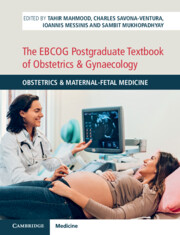Book contents
- The EBCOG Postgraduate Textbook of Obstetrics & Gynaecology
- The EBCOG Postgraduate Textbook of Obstetrics & Gynaecology
- Copyright page
- Dedication
- Contents
- Contributors
- Preface
- Section 1 Basic Sciences in Obstetrics
- Section 2 Early Pregnancy Problems
- Section 3 Fetal Medicine
- Section 4 Maternal Medicine
- Chapter 25 Hypertensive Disorders in Pregnancy and Eclampsia
- Chapter 26 Obesity and Metabolic Syndrome in Pregnancy
- Chapter 27 Screening for Gestational Diabetes Mellitus and Care of Diabetes Mellitus in Pregnancy
- Chapter 28 Cardiac Disease in Pregnancy
- Chapter 29 Respiratory Disease in Pregnancy
- Chapter 30 Thromboembolism in Pregnancy
- Chapter 31 Haemoglobinopathies in Pregnancy
- Chapter 32 Kidney Diseases in Pregnancy
- Chapter 33 Gastrointestinal Disorders in Pregnancy
- Chapter 34 Systemic Lupus Erythematosus and Pregnancy
- Chapter 35 Autoimmune Rheumatic Disorders in Pregnancy
- Chapter 36 Thyroid Disease in Pregnancy
- Chapter 37 Infections in Pregnancy
- Chapter 38 HIV Infection in Pregnancy
- Chapter 39 Acute Management of Sepsis in Pregnancy
- Chapter 40 Psychological Disorders in Pregnancy
- Chapter 41 Pregnancy after Solid Organ Transplantation
- Chapter 42 Oral Health and Periodontal Diseases in Pregnancy
- Section 5 Intrapartum Care
- Section 6 Neonatal Problems
- Section 7 Placenta
- Section 8 Public Health Issues in Obstetrics
- Section 9 Co-Morbidities during Pregnancy
- Index
- Plate Section (PDF Only)
- References
Chapter 26 - Obesity and Metabolic Syndrome in Pregnancy
from Section 4 - Maternal Medicine
Published online by Cambridge University Press: 20 November 2021
- The EBCOG Postgraduate Textbook of Obstetrics & Gynaecology
- The EBCOG Postgraduate Textbook of Obstetrics & Gynaecology
- Copyright page
- Dedication
- Contents
- Contributors
- Preface
- Section 1 Basic Sciences in Obstetrics
- Section 2 Early Pregnancy Problems
- Section 3 Fetal Medicine
- Section 4 Maternal Medicine
- Chapter 25 Hypertensive Disorders in Pregnancy and Eclampsia
- Chapter 26 Obesity and Metabolic Syndrome in Pregnancy
- Chapter 27 Screening for Gestational Diabetes Mellitus and Care of Diabetes Mellitus in Pregnancy
- Chapter 28 Cardiac Disease in Pregnancy
- Chapter 29 Respiratory Disease in Pregnancy
- Chapter 30 Thromboembolism in Pregnancy
- Chapter 31 Haemoglobinopathies in Pregnancy
- Chapter 32 Kidney Diseases in Pregnancy
- Chapter 33 Gastrointestinal Disorders in Pregnancy
- Chapter 34 Systemic Lupus Erythematosus and Pregnancy
- Chapter 35 Autoimmune Rheumatic Disorders in Pregnancy
- Chapter 36 Thyroid Disease in Pregnancy
- Chapter 37 Infections in Pregnancy
- Chapter 38 HIV Infection in Pregnancy
- Chapter 39 Acute Management of Sepsis in Pregnancy
- Chapter 40 Psychological Disorders in Pregnancy
- Chapter 41 Pregnancy after Solid Organ Transplantation
- Chapter 42 Oral Health and Periodontal Diseases in Pregnancy
- Section 5 Intrapartum Care
- Section 6 Neonatal Problems
- Section 7 Placenta
- Section 8 Public Health Issues in Obstetrics
- Section 9 Co-Morbidities during Pregnancy
- Index
- Plate Section (PDF Only)
- References
Summary
The term obesity refers to an excess of body fat. As direct measurements of total body fat mass are complex, body mass index (BMI) is commonly used in clinical practice as an obesity index. BMI may be defined as a person’s weight in kilograms divided by the square of her height in meters (kg/m2). Table 26.1 outlines the BMI categories frequently used in clinical practice, with a BMI ≥30 mg/m2 categorized as obesity [1]. Due to the multiple changes in body mass that take place during pregnancy, pregnant women are typically described based on their pre-pregnancy BMI.
- Type
- Chapter
- Information
- The EBCOG Postgraduate Textbook of Obstetrics & GynaecologyObstetrics & Maternal-Fetal Medicine, pp. 213 - 220Publisher: Cambridge University PressPrint publication year: 2021



